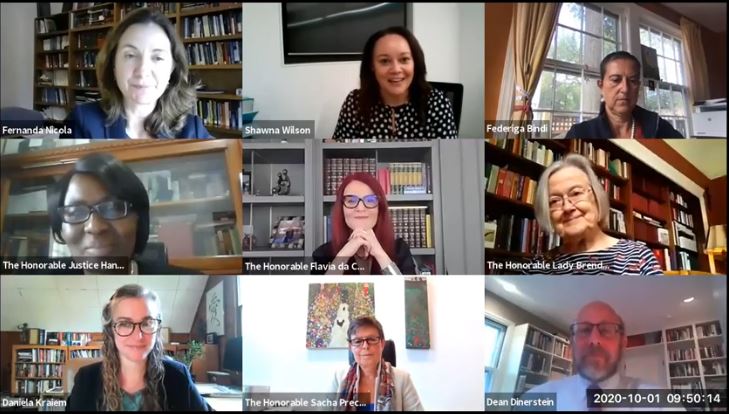Women and the Law Program Host Virtual Panel, "Women Judges from Around the World Remember RBG”
Judges from Across the Globe Discuss Justice Ginsburg’s Lasting Impact
Oct. 6, 2020
On Thursday, Oct. 1, the Women and the Law Program, the International Association of Women Judges (IAWJ), and the Institute for Women’s Policy Research hosted a conversation on the global impact of U.S. Supreme Court Justice Ruth Bader Ginsburg.
The webinar – moderated by IAWJ’s Shawna Wilson ’00 and Women and the Law Director Daniela Kraiem – honored the late Justice, who inspired and engaged with jurists, lawyers, scholars, and students worldwide. Four women judges from across the globe reflected upon the indelible mark she left at home and abroad, including Lady Brenda Hale, the first female president of the United Kingdom Supreme Court.
Speakers included:
- Rt Hon. the Baroness Brenda Hale of Richmond DBE (former president, Supreme Court of the UK)
- Hon. Justice Hannah Okwengu (Court of Appeal of Kenya)
- Hon. Judge Alexandra Prechal (Court of Justice for the European Union)
- Hon. Judge Flavia Viana (Court of Justice of the State of Paraná, Brazil)
In his welcome to participants and attendees, Acting Dean Robert Dinerstein said, “It is fitting as we look at her role as a feminist, and as a female justice, to have her be honored by the distinguished group of people we have here today.”
Hale noted Ginsburg was the best ambassador abroad for the U.S. Supreme Court that there has been in her lifetime, and perhaps ever, citing the quality and openness of her jurisprudence.
“She reminded the skeptics that the framers of the Declaration of Independence had started their reasons out of ‘a decent respect to the opinions of mankind,’” Hale said. “She thought that just as countries with more recent constitutions might have something to learn from the constitutional review in the United States, so might the United States have something to learn from the other nations which are now engaged in the same enterprise.”
Okwengu called Ginsburg’s life an “embodiment of justice.”
“It is apparent Justice Ginsburg’s interest in gender equality was ignited by the gender discrimination she faced earlier in life,” Okewengu said. “The barriers did not deter her from her chosen path, but instead prepared her to fight and create opportunities that had not existed for people like her.”
“What I very much value in the approach to equality by Justice Ginsburg is the strategy of small steps – bringing about gradual change to the laws, since this is really crucial for acceptance of those changes,” Prechal said. “But to achieve this, one most dispose of great intellectual rigor, vision, severance and patience as she did.”
During a trip to New York, Viana saw a portrait of Ginsburg, and became compelled to learn more about her life and work. In discovering more about Ginsburg’s struggle for equality in the U.S., Viana realized there was so much more to be done in Brazil in the fight for equality.
“I’ve been working very hard on trying to make a difference. As Justice Ginsburg once mentioned in an interview, ‘Whatever you choose to do, leave tracks.’ Don’t do just for yourself…You want to leave the world a little better than when you had lived.”
The event was supported in part by the THE STATE OF WOMEN: Mapping Women Leadership in the World project, Erasmus+ Programme of the European Union, described by Professor Federiga Bindi. The Program on International Organizations, Law and Development Director and Professor Fernanda Nicola provided closing remarks following a Q&A session.
The webinar was co-sponsored by the International and Comparative Legal Studies Program, Center on Human Rights and Humanitarian Law, and the Academy on Human Rights and Humanitarian Law.
